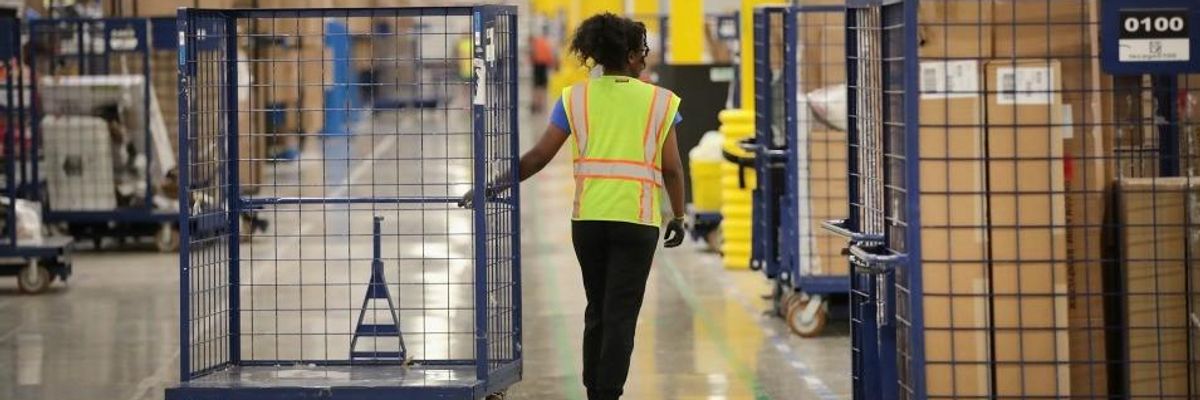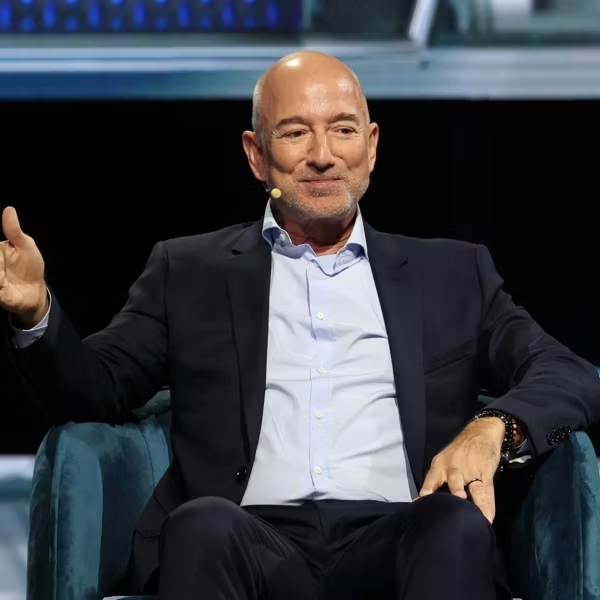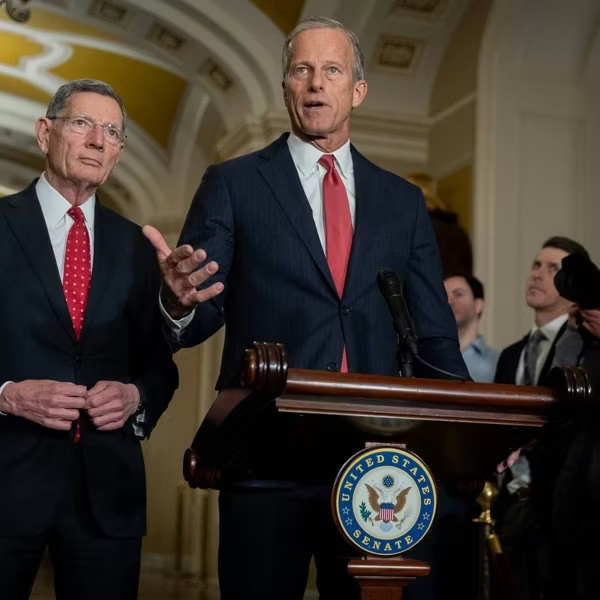
Large corporations like Amazon received the vast majority of the Republican tax cuts in 2017, while workers who keep those companies running in offices and warehouses across the country got just six percent of the cuts. (Photo: Scott Olson/Getty Images)
While Corporate Profits and Tax-Dodging Soared, Analysis Shows Just 6% of GOP 'Tax Scam' Benefits Went to Workers
In addition to promises that turned out to be "meaningless," the Republican tax reform effort included "egregious mistakes" that opened the system to increased corporate fraud
A new six-month analysis of President Donald Trump's 2017 tax cuts details how workers received little benefit from the plan, despite the savings many of their powerful corporate employers received.
The Center for Public Integrity (CPI) interviewed independent tax analysts and officials who were involved in the Republican Party's effort to sell the so-called American Tax Cuts and Jobs Act to the public--and within their own party ranks. Progressive critics have consistently called the law nothing nothing more than a "tax scam."
The GOP's insistence on a tax law which included the largest corporate tax cut in U.S. history--from 35 to 21 percent--resulted in companies saving about $150 billion in the first year after the passage in December 2017.
Trump and then-House Speaker Paul Ryan had spent months telling Americans they stood to save hundreds or even thousands of dollars in taxes, with Trump telling one crowd that the average family would see a pay raise of about $4,000, a benefit that would "trickle down" from employers' corporate tax cuts.
In fact, CPI reporters Peter Cary and Allan Holmes wrote in The Guardian, companies instead distributed their savings amongst the few Americans who hold stock in their corporations:
The bulk of the $150 billion the tax cut put into the hands of corporations in 2018 went into shareholder dividends and stock buy-backs, both of which line the pockets of the 10 percent of Americans who own 84 percent of the stocks.
Just 6 percent of the tax savings was spent on workers, according to Just Capital, a not-for-profit that tracks the Russell 1000 index.
Far from the $4,000 raises Trump alluded to, CPI found, the average paycheck went up about $6, or $233 per year.
The report also detailed how Republicans pushed through a proposal which would force the government to borrow trillions of dollars, despite the GOP's frequent claims of opposition to adding to the federal deficit:
In a meeting that was the key turning point in the entire process, the Senate's most vocal deficit hawk, Republican Bob Corker of Tennessee,who wanted to create no new debt, sat down with the Senate's most strident supply-sider, Republican Pat Toomey of Pennsylvania, who wanted to borrow $2.5 trillion to pay for the tax cuts. They agreed on borrowing $1.5 trillion over 10 years. The meeting lasted all of 10 minutes.
CPI drew three main conclusions from their extensive research into the effects of the tax cuts: that the law "was first and foremost a gift to multinationals;" that Republicans' claims that they aimed to "reform" the tax code without adding to the deficit were "meaningless;" and that it left the tax system vulnerable to abuse by corporations committed to tax avoidance.
The law "contained egregious mistakes, created massive new loopholes, and opened the door to new forms of tax avoidance," write Cary and Holmes.
The group's findings were released a day after a Monmouth poll showed that the long-term effects of Trump's $1.5 trillion tax plan have not been lost on the working families who were largely left out of its benefits.
Just 12 percent of people polled by Monmouth said they had "benefited a great deal from recent growth in the U.S. economy," and 18 percent said Trump's economic policies had helped the middle class. The poll was taken as the president points to low unemployment numbers, a growing GDP, and a strong stock market as irrefutable evidence that the economy is working for all Americans.
"Maybe Americans are better off than they were a few years ago on average," wrote Vice's Alex Norcia of the poll, "but maybe they're also more aware of inequality, or have a sense of being cheated."
An Urgent Message From Our Co-Founder
Dear Common Dreams reader, The U.S. is on a fast track to authoritarianism like nothing I've ever seen. Meanwhile, corporate news outlets are utterly capitulating to Trump, twisting their coverage to avoid drawing his ire while lining up to stuff cash in his pockets. That's why I believe that Common Dreams is doing the best and most consequential reporting that we've ever done. Our small but mighty team is a progressive reporting powerhouse, covering the news every day that the corporate media never will. Our mission has always been simple: To inform. To inspire. And to ignite change for the common good. Now here's the key piece that I want all our readers to understand: None of this would be possible without your financial support. That's not just some fundraising cliche. It's the absolute and literal truth. We don't accept corporate advertising and never will. We don't have a paywall because we don't think people should be blocked from critical news based on their ability to pay. Everything we do is funded by the donations of readers like you. Will you donate now to help power the nonprofit, independent reporting of Common Dreams? Thank you for being a vital member of our community. Together, we can keep independent journalism alive when it’s needed most. - Craig Brown, Co-founder |
A new six-month analysis of President Donald Trump's 2017 tax cuts details how workers received little benefit from the plan, despite the savings many of their powerful corporate employers received.
The Center for Public Integrity (CPI) interviewed independent tax analysts and officials who were involved in the Republican Party's effort to sell the so-called American Tax Cuts and Jobs Act to the public--and within their own party ranks. Progressive critics have consistently called the law nothing nothing more than a "tax scam."
The GOP's insistence on a tax law which included the largest corporate tax cut in U.S. history--from 35 to 21 percent--resulted in companies saving about $150 billion in the first year after the passage in December 2017.
Trump and then-House Speaker Paul Ryan had spent months telling Americans they stood to save hundreds or even thousands of dollars in taxes, with Trump telling one crowd that the average family would see a pay raise of about $4,000, a benefit that would "trickle down" from employers' corporate tax cuts.
In fact, CPI reporters Peter Cary and Allan Holmes wrote in The Guardian, companies instead distributed their savings amongst the few Americans who hold stock in their corporations:
The bulk of the $150 billion the tax cut put into the hands of corporations in 2018 went into shareholder dividends and stock buy-backs, both of which line the pockets of the 10 percent of Americans who own 84 percent of the stocks.
Just 6 percent of the tax savings was spent on workers, according to Just Capital, a not-for-profit that tracks the Russell 1000 index.
Far from the $4,000 raises Trump alluded to, CPI found, the average paycheck went up about $6, or $233 per year.
The report also detailed how Republicans pushed through a proposal which would force the government to borrow trillions of dollars, despite the GOP's frequent claims of opposition to adding to the federal deficit:
In a meeting that was the key turning point in the entire process, the Senate's most vocal deficit hawk, Republican Bob Corker of Tennessee,who wanted to create no new debt, sat down with the Senate's most strident supply-sider, Republican Pat Toomey of Pennsylvania, who wanted to borrow $2.5 trillion to pay for the tax cuts. They agreed on borrowing $1.5 trillion over 10 years. The meeting lasted all of 10 minutes.
CPI drew three main conclusions from their extensive research into the effects of the tax cuts: that the law "was first and foremost a gift to multinationals;" that Republicans' claims that they aimed to "reform" the tax code without adding to the deficit were "meaningless;" and that it left the tax system vulnerable to abuse by corporations committed to tax avoidance.
The law "contained egregious mistakes, created massive new loopholes, and opened the door to new forms of tax avoidance," write Cary and Holmes.
The group's findings were released a day after a Monmouth poll showed that the long-term effects of Trump's $1.5 trillion tax plan have not been lost on the working families who were largely left out of its benefits.
Just 12 percent of people polled by Monmouth said they had "benefited a great deal from recent growth in the U.S. economy," and 18 percent said Trump's economic policies had helped the middle class. The poll was taken as the president points to low unemployment numbers, a growing GDP, and a strong stock market as irrefutable evidence that the economy is working for all Americans.
"Maybe Americans are better off than they were a few years ago on average," wrote Vice's Alex Norcia of the poll, "but maybe they're also more aware of inequality, or have a sense of being cheated."
A new six-month analysis of President Donald Trump's 2017 tax cuts details how workers received little benefit from the plan, despite the savings many of their powerful corporate employers received.
The Center for Public Integrity (CPI) interviewed independent tax analysts and officials who were involved in the Republican Party's effort to sell the so-called American Tax Cuts and Jobs Act to the public--and within their own party ranks. Progressive critics have consistently called the law nothing nothing more than a "tax scam."
The GOP's insistence on a tax law which included the largest corporate tax cut in U.S. history--from 35 to 21 percent--resulted in companies saving about $150 billion in the first year after the passage in December 2017.
Trump and then-House Speaker Paul Ryan had spent months telling Americans they stood to save hundreds or even thousands of dollars in taxes, with Trump telling one crowd that the average family would see a pay raise of about $4,000, a benefit that would "trickle down" from employers' corporate tax cuts.
In fact, CPI reporters Peter Cary and Allan Holmes wrote in The Guardian, companies instead distributed their savings amongst the few Americans who hold stock in their corporations:
The bulk of the $150 billion the tax cut put into the hands of corporations in 2018 went into shareholder dividends and stock buy-backs, both of which line the pockets of the 10 percent of Americans who own 84 percent of the stocks.
Just 6 percent of the tax savings was spent on workers, according to Just Capital, a not-for-profit that tracks the Russell 1000 index.
Far from the $4,000 raises Trump alluded to, CPI found, the average paycheck went up about $6, or $233 per year.
The report also detailed how Republicans pushed through a proposal which would force the government to borrow trillions of dollars, despite the GOP's frequent claims of opposition to adding to the federal deficit:
In a meeting that was the key turning point in the entire process, the Senate's most vocal deficit hawk, Republican Bob Corker of Tennessee,who wanted to create no new debt, sat down with the Senate's most strident supply-sider, Republican Pat Toomey of Pennsylvania, who wanted to borrow $2.5 trillion to pay for the tax cuts. They agreed on borrowing $1.5 trillion over 10 years. The meeting lasted all of 10 minutes.
CPI drew three main conclusions from their extensive research into the effects of the tax cuts: that the law "was first and foremost a gift to multinationals;" that Republicans' claims that they aimed to "reform" the tax code without adding to the deficit were "meaningless;" and that it left the tax system vulnerable to abuse by corporations committed to tax avoidance.
The law "contained egregious mistakes, created massive new loopholes, and opened the door to new forms of tax avoidance," write Cary and Holmes.
The group's findings were released a day after a Monmouth poll showed that the long-term effects of Trump's $1.5 trillion tax plan have not been lost on the working families who were largely left out of its benefits.
Just 12 percent of people polled by Monmouth said they had "benefited a great deal from recent growth in the U.S. economy," and 18 percent said Trump's economic policies had helped the middle class. The poll was taken as the president points to low unemployment numbers, a growing GDP, and a strong stock market as irrefutable evidence that the economy is working for all Americans.
"Maybe Americans are better off than they were a few years ago on average," wrote Vice's Alex Norcia of the poll, "but maybe they're also more aware of inequality, or have a sense of being cheated."

